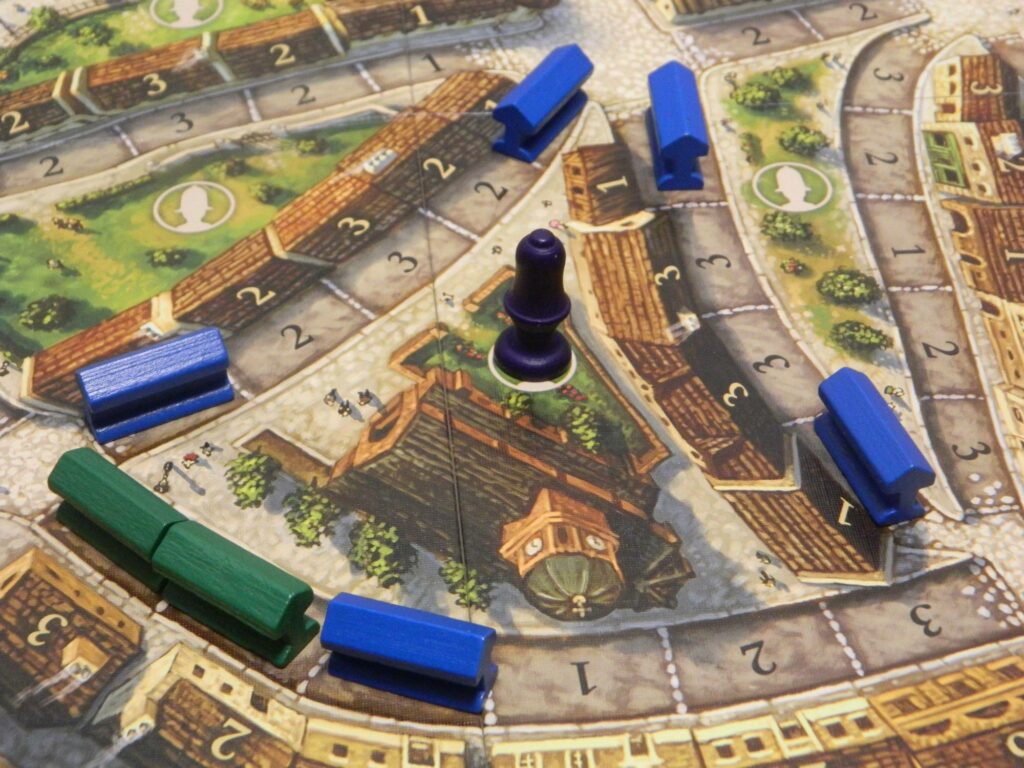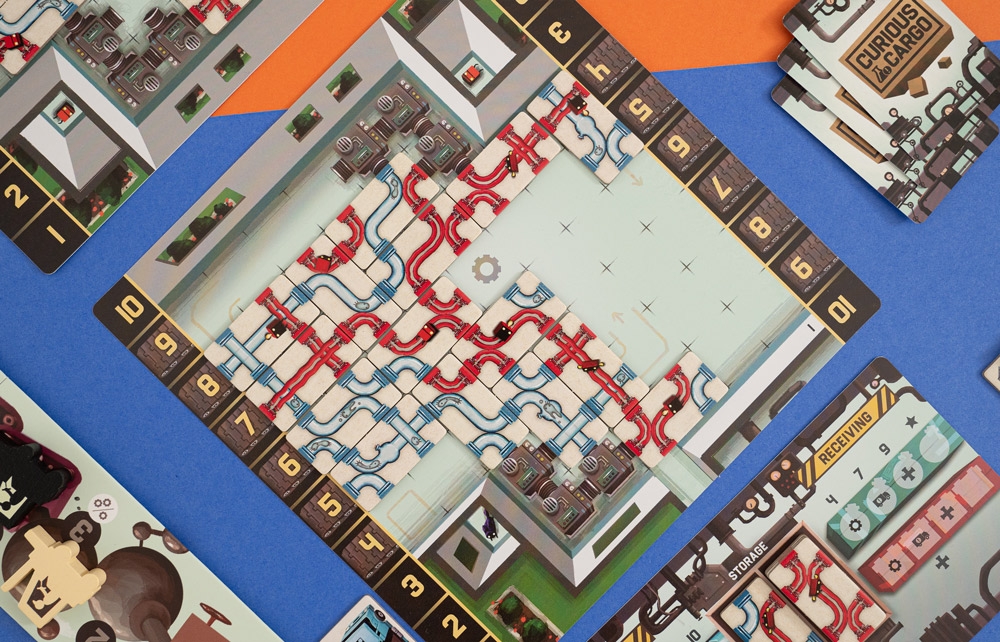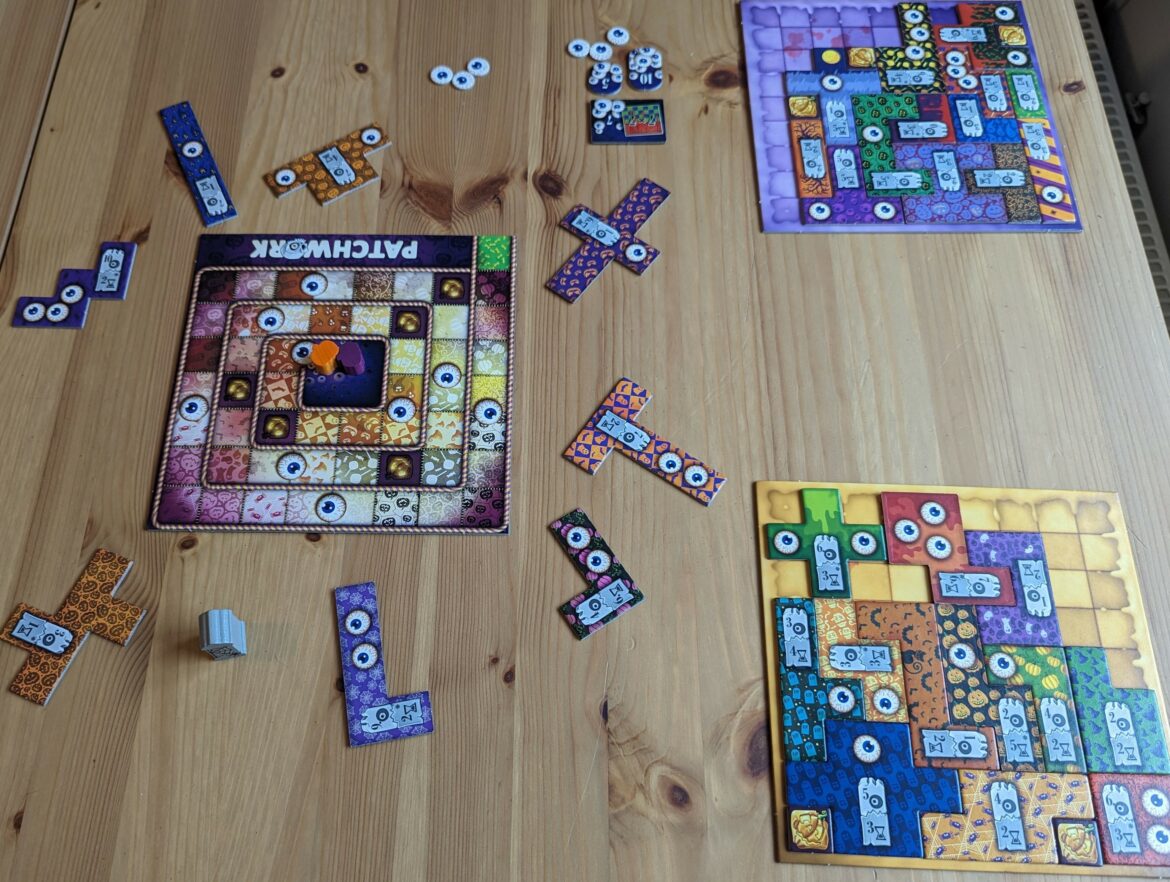These days my partner and I play more boardgames than ever, despite our regular gaming group being something we left behind when we moved away from Brighton. (Don’t feel too sorry for us: we still have friends with whom we can play, we just lack the regularity of that old group.) We play more two-player games than we did in the past; fortunately there are no shortage of these.
Here are some first impressions of what we’ve played this month: Cosmic Encounters Duel, Portobello Market, Patchwork, and Curious Cargo.
Cosmic Encounters Duel
This was picked up at a discount from Ropecon’s vendor hall. Reviews on BoardGameGeek were middling, so we didn’t want to pay full price… but after our first game, we were pleasantly surprised.
It’s a little tricky to pick up just from the rules, as the duels that are central to the game have quite a few steps and the rules as written are a bit much. Happily examples are also included, and as soon as you start playing through duels everything becomes more clearer.
The basic idea is that cards are dealt form three decks to determine the game’s events, to which you react. Often these events are the revealing of a planet over which you duel. This is done by committing ships, by playing cards with different number values, and by playing tactics that can destroy enemy ships and buff your defenses. There’s more to it than that – tactics need to be reset once used, you can play reinforcements cards, there are ‘envoys’ with special rules, and each alien you can play as is unique – but that’s the gist. The winner takes the planet, and the first to five wins.
As a package it’s delightful, with lots of nice pieces that are fun to look at and satisfying to play with. There are quite a few means by which you can compose strategies for duels and surprise your opponent. It also feels quite replayable; like its big brother, the enduring Cosmic Encounter, there are loads of different aliens you can play as. We look forward to future matches, and we hope that the duel mechanic continues to feel fresh and interesting – as there’s not too much game outside it.
Portobello Market
This was also a purchase from Ropecon, but this was in the flea market and my partner picked it up for just 10 Euros. A bargain!
Superficially it looks a little like Ticket to Ride, with lines of market stalls stretching between nodes on the board, but in practical terms it is nothing like that game. Rather, the idea is that each of one to four players uses their actions to place market stalls along the sides of streets and place customers in the spots where multiple streets meet.

Players are constrained by having limited actions – you flip a token determining how many actions you get that turn – and only being able to place stalls around where the ‘Bobby’ is standing. The Bobby can be freely moved as many times as you like, but victory points must be paid as a penalty if you move the Bobby over chains of stalls where you do not hold a majority of occupied spots.
Victory points are primarily earned after placing customers, which are drawn randomly from a bag. VPs are earned when there is a customer at each end of a completed line of stalls, and the combination of customer types decides the multiplier on eligible players’ VP score. Once a player has put down all their stalls, the game ends.
There’s a few more mechanic tricks here, such as several action tokens allowing you to earn massive amounts of VP at the cost of slightly reduced actions for the remainder of the game, but that’s the gist. It’s pretty fun, and quite swingy as VP are earned in huge chunks outside of the low-value ‘tax’ earned from moving the Bobby. As a two-player game we feel it will get old a little quickly, as head to head things are a little too easy to with, but with three or four players we think it would turn into a fairly compelling competitive puzzle.
Patchwork
Patchwork’s a simple game that I gather has been around a while. We have a Halloween edition, so it’s festooned with skulls and spiders and other oogly things. Perfect!
In Patchwork, players are moving along a shared board at the same time as trying to assemble a ‘quilt’ on their own board. They take it in turns to choose and purchase one of three available pieces. If they can’t afford a piece, they can pass and move along the shared board, which earns a little currency. Choosing pieces can be tricky, as you want to fit these oddly-shaped tetronimo pieces together as best they can – the final scoring will penalize you for any gaps. Players may also want to avoid pieces that move them too rapidly along the shared board – because once you reach the center, you can’t move further or acquire more pieces – and get hold of pieces that can boost their income. Your currency also equates to points at the end of the game, you see.
Patchwork needs a fair bit of space to play – that shared pool of pieces needs a lot of room to lay out – but it’s a simple and fun game. I’ve so far only played it head to head, and I suspect games with more players will get deliciously chaotic.
Curious Cargo
This game was quite the brain twister to get to grips with. The basic gist is that two players draw tiles from a bag and attempt to set up conveyor belts for export and import from their factory / warehouse, and draw and place trucks with which to ship out items. The challenge is that you have limited space to store tiles and your lines quickly become confusing spaghetti. To make matters worse, trucks only load or unload from specific slots, so the position of trucks and where conveyor belts terminate on your board edge matters immensely. Trucks only move when ‘pushed’ by a new truck being placed, so planning is important. The cherry on top is that anything you export can be stolen by another player, which you don’t want to happen.
In practice you have an awful lot to keep track of: where your export lines terminate, where your import lines terminate, the sequence of trucks and when you will be sending them to your opponents’ board, the position of your opponents’ import lines, what you currently have in your storage, when you can seize bonus tokens for meeting minor objectives, and of course which of the several paths to victory you are pursuing.
I didn’t initially enjoy my first game of Curious Cargo, as I found that it was almost over before I was in a position to really start exporting. I guess the issue in this first game was that the theme gave me a certain set of expectations that don’t really correspond to the mechanics. It may have felt worse for my opponent, as I nabbed most of the important ‘splitter’ tiles before she could. It’s certainly not a light game, and decision paralysis frequently set in. But we will play it again, and perhaps with a few games under our belt we’ll have more confidence in what we’re doing.


